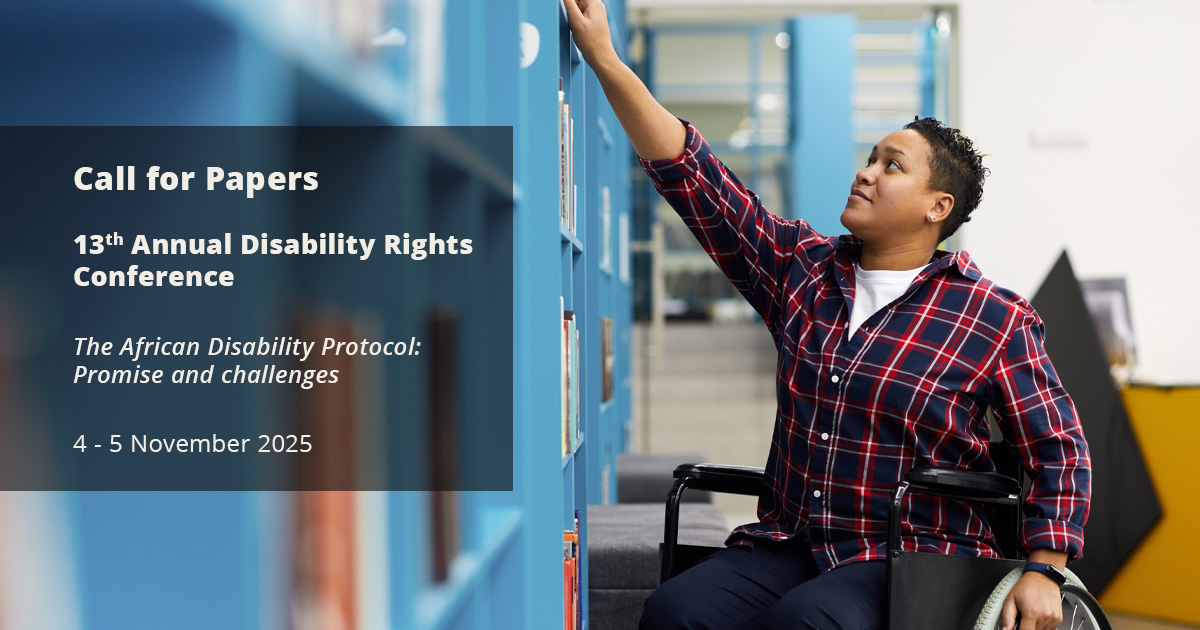The Centre for Human Rights, Faculty of Law, University of Pretoria, is convening the 13th Annual Disability Rights in Africa conference from 4 - 5 November 2025. The theme for this year’s conference is “The African Disability Protocol: Promise and challenges.” The conference aims to critically engage with the substantive content of the Protocol to the African Charter on Human and Peoples’ Rights on the Rights of Persons with Disabilities in Africa (African Disability Protocol) and to interrogate strategies for its successful implementation, to bring about the desired social change. The conference will explore the unique contribution of the African Disability Protocol, in light of the existence of other human rights instruments that already address the subject of disability and are widely ratified by African States. These other instruments include the Convention on the Rights of Persons with Disabilities (CRPD) and the African Charter on Human and Peoples’ Rights (African Charter). The annual disability conference is a flagship platform for convening dialogue among key stakeholders on disability rights and to spotlight pertinent and emerging disability rights concerns in the African region.
Rationale
In January 2018, the African Union adopted the African Disability Protocol pursuant to article 66 of the African Charter, which permits the adoption of additional Protocols to complement the Charter. The adoption of the African Disability Protocol occurred nearly ten years after the coming into force of the CRPD in response to a clarion call by members of the African disability rights movement for an African disability instrument. During this period, the majority of African States had already ratified the CRPD, a global instrument that many consider the gold standard in disability rights protection, with 49 of the 55 African Union Member States having ratified it by 2019 and 53 states having signed it. Nevertheless, it was felt that the CRPD does not address matters that are unique to Africa, such s harmful practices that fuel a range of human rights violations against persons with disabilities, particularly persons with albinism. For this reason, it was argued that the ability of the CRPD to provide adequate rights protection in Africa is curtailed, making it necessary to develop an African instrument with contextualised provisions that respond to African realities. The adoption by the African Union of the African Disability Protocol was therefore, welcomed as a crucial step in creating an enabling legal framework for the adequate protection of the rights of persons with disabilities in Africa.
The subsequent coming into force of the African Disability Protocol on 3 May 2024, six years after its adoption, brought a renewed sense of hope for a more disability-inclusive Africa.
African States now face the challenge of translating the Protocol into social change that impacts persons with disabilities at an individual level. To that end, this conference brings together key stakeholders to exchange knowledge, experience and ideas for the successful implementation of the African Disability Protocol.
Participation
The conference will bring together stakeholders interested in promoting the rights of persons with disabilities in Africa, including persons with disabilities and their representative organisations, scholars, policymakers, individual researchers, and other human rights defenders.
The conference will be held in hybrid format, with some participants attending in person in Johannesburg, South Africa and others virtually.
Call for papers
To inform the deliberations at the conference, a number papers will be presented and discussed. These will be selected from amongst abstract submissions on a number of topics including:
- Critical analysis of specific rights in the African Disability Protocol
- How the Protocol compares with other instruments
- The Protocol’s contribution to the African Human Rights system
- The Protocol’s contribution to disability rights discourse
- Potential opportunities, challenges and strategies for the Protocol’s implementation
- Lessons on implementation from other comparable instruments
- The role of various stakeholders in implementing the Protocol
- The role of African Human Rights mechanisms in advancing the implementation of the Protocol
- Capacity strengthening and awareness-raising on the Protocol
- Focus on provisions relating to specific groups or themes in the Protocol
As part of underscoring the importance of multi-sectoral responses and partnerships in the production of knowledge, we particularly encourage joint abstracts between scholars, policymakers and persons with disabilities together with their representative organisations.
Abstract submission
Interested authors are invited to submit a 300 – 350-word abstract (in MS Word) on their proposed research. The abstract should highlight the key findings, innovations, unique insights, and the prospective recommendations of the proposed paper.
The abstract must also include (in a single document) the proposed title; the author’s name; affiliation, and e-mail address. Abstracts must be sent by email to Sabeeha Majid at the following email address: disabilityconference@up.ac.za
Submission deadline for Abstracts is 15 July 2025. Authors will be notified by 31 July 2025 whether their abstract has been accepted. Authors whose abstracts are accepted will be required to submit their full papers by 31 August 2025
Papers presented at the conference will be considered for publication in the 2026 volume of the African Disability Rights Yearbook.
